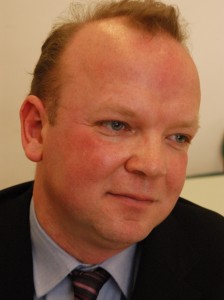‘Commonwealth has its head in the sand on LGBT rights and HIV’

Responding to our recent reports about anti-LGBT laws fuelling the rising rates of HIV across the Commonwealth, Jonathan Cooper OBE (pictured), Chief Executive of the Human Dignity Trust, says the Commonwealth has its head in the sand: 
The Commonwealth Heads of Government have met. It will be another two years before they meet again. With 2.3 billion souls, the Commonwealth contains a third of the world’s population. Yet, Commonwealth countries account for over 60% of HIV cases worldwide. AIDS is a crisis for the Commonwealth. It is estimated that a new person catches HIV every 12 seconds, and someone dies of AIDS every 15 seconds. If 60% of these cases are in the Commonwealth, by the time of the next Commonwealth leaders meeting, over 3 million Commonwealth citizens will be newly infected and 2.5 million dead.
The Commonwealth and its leaders are in denial about a crucial part of stemming the HIV/AIDS crisis: decriminalising homosexuality. 40 out of 53 Commonwealth countries criminalise consensual sex between same-sex adults, being home to 90% of all Commonwealth citizens. The sad fact is that, by maintaining these criminal laws, Commonwealth leaders are acting recklessly towards the health and well-being of their people and are complicit in perpetuating the HIV/AIDS crisis. The link between laws that criminalise homosexuality and increased HIV transmission is undeniable. Public health experts confirm this time and time again. To give just one example, the prevalence of HIV among gay men in the Commonwealth Caribbean stands at a shocking 1 in 4. In other Caribbean countries it is 1 in 15. The former criminalise homosexuality, the latter do not.
The HIV/AIDS pandemic simply cannot be brought under control while gay sex remains a crime. These laws stigmatise LGBT people and hinder their access to HIV education, prevention, testing and treatment services. While the international community pumps millions of pounds into efforts to eradicate HIV, the fight against HIV/AIDS efforts is hamstrung by these criminalising laws. There are no ifs, no buts, and no arguments in supposed cultural relativism – these laws must be repealed.
So what is the Commonwealth doing to address this? Nothing. At the end of their meeting, Commonwealth leaders made lots of worthy commitments from tackling climate change to upholding the rights of women and girls, but they did not pledge to tackle HIV/AIDS. The degree to which the Commonwealth has stuck its head in the sand borders on the farcical. Yesterday [1 December], the Commonwealth Secretariat hosted an event to coincide with World AIDS day on ‘Getting to zero: through universal health coverage’. The criminalisation of homosexuality and LGBT people were not mentioned – not once. How can HIV/AIDS ever be eradicated if gay men and trans women and their vulnerability to HIV infection are ignored? Likewise, the Commonwealth’s statement issued at the end of the Commonwealth leaders meeting makes no reference at all to LGBT people. It beggars belief that an organisation that supposedly stands for the ‘promotion of peace and prosperity to improve the lives of all peoples of the Commonwealth’ is so timid that it cannot even acknowledge that LGBT people exist.
This may come as a shock, but LGBT people do exist in the Commonwealth, and in great numbers too. Perhaps 230 million (10% of) Commonwealth citizens will at some point have gay sex, and would benefit from HIV education and services aimed at them. Yet, the Commonwealth remains perfectly content to ignore the needs of a group equivalent in size to its entire membership in Southern Africa, East Africa, the Caribbean, Pacific and Indian Ocean. Why must the Commonwealth’s LGBT citizens tolerate invisibility? If this organisation is to remain relevant it must work for all citizens.
The Commonwealth now has a new Secretary General, Patricia Scotland, a Dominican by birth who took the British establishment by storm. An outstanding barrister, she went on to become the Attorney General of England and Wales. She is now better known as Baroness Scotland. Patricia Scotland sums up all that is best about the Commonwealth. But, she faces a daunting task. If the Commonwealth has a future, she must prioritise making the Commonwealth meaningful to everyone and that includes LGBT people. Once she does that, she may become the Secretary General that begins to get the AIDS crisis under control. That’s a legacy worth having.
Words by JONATHAN COOPER, Chief Executive, Human Dignity Trust
